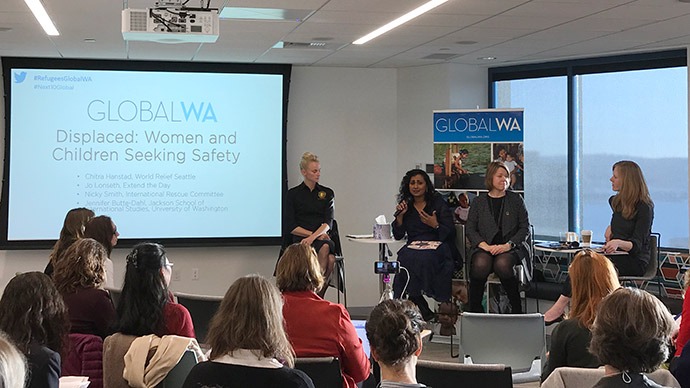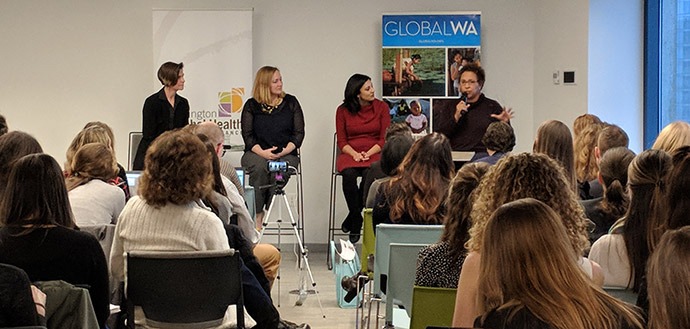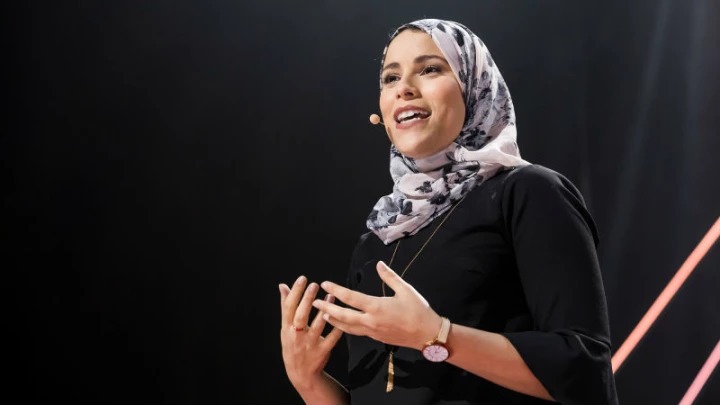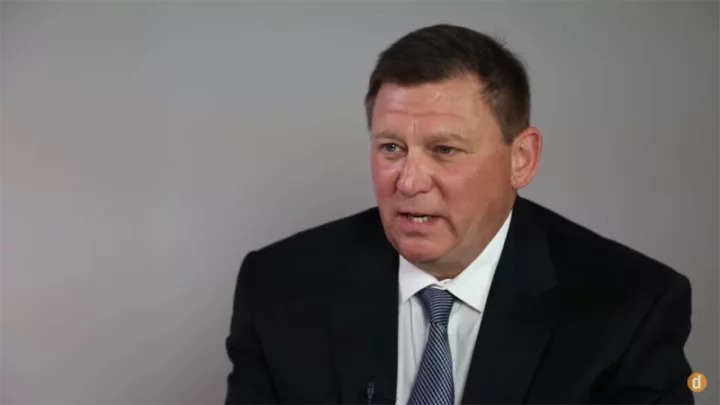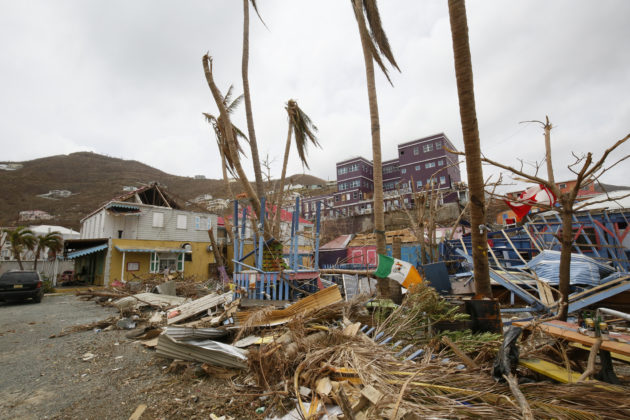Welcome to the December 2017 issue of the Global Washington newsletter.
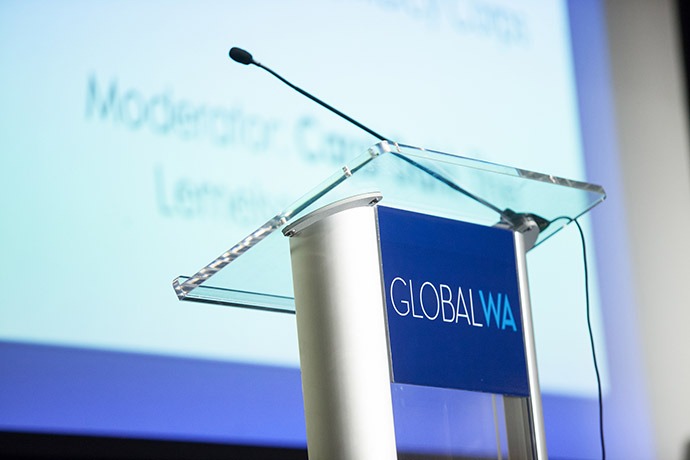
IN THIS ISSUE
Letter from our Executive Director
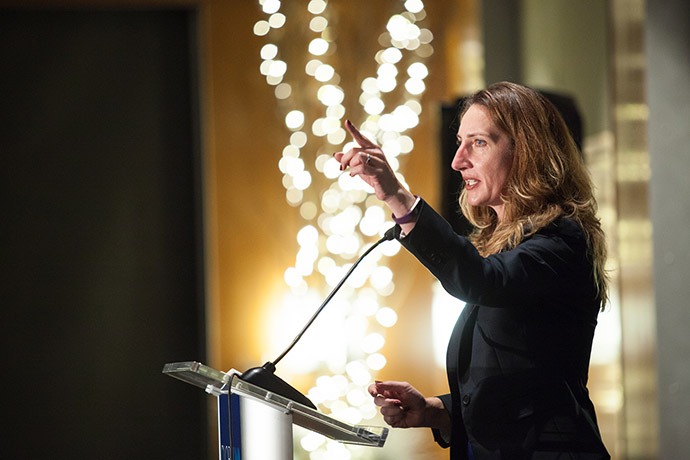
Photo: Kristen Dailey, Executive Director of Global Washington.
This year’s Global Washington Annual Conference explored the theme of “Renewing Global Leadership” and brought together over 400 members of the global development community. In a world grappling with the shifting economic, political and cultural implications of globalization, we exchanged ideas and expertise to define the leadership that is called for.
We also examined the roles of international non-profits and humanitarian aid workers, global companies and employees, leading academic institutions and students, philanthropists and community organizers, governments and citizens—and how each brings unique talents to thorny challenges.
We celebrated Northwest leaders who are truly global leaders, discussed disruptive leadership, and affirmed that some of the most powerful leaders in a community can be a mom or a young woman who is leading from the margins. We were also inspired to find authentic leadership within all of us and to connect our personal story to our work.
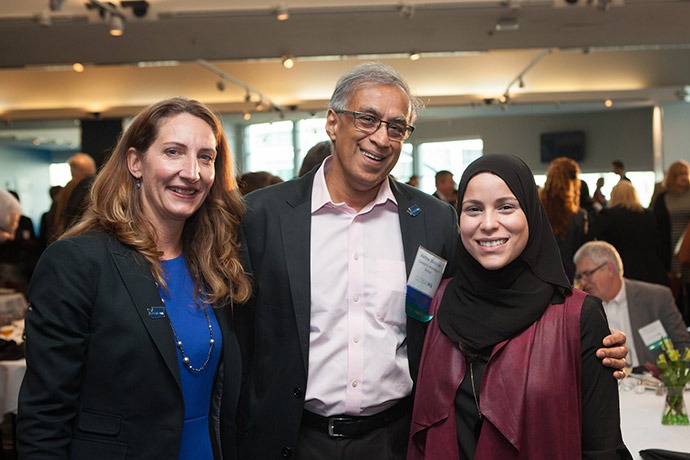
Photo: Kristen Dailey, Executive Director of GlobalWA; Akhtar Badshah, President & Chair of the board for GlobalWA; Alaa Murabit, Founder of the Voice of Libyan Women.
New, bold leadership is needed to navigate a more equitable and prosperous future for us all. We are extremely honored and inspired by those who joined us to renew an understanding of what it means to be global, refresh connections with others who are doing this work, and restore strength and a commitment to making the world a better place for everyone.
I hope you enjoy the recap below from this year’s conference. We look forward to seeing you at our next one, where we’ll also be celebrating our 10 year anniversary! Please save the date: December 6, 2018.

Kristen Dailey
Executive Director
Back to Top
Opening Keynote Discussion
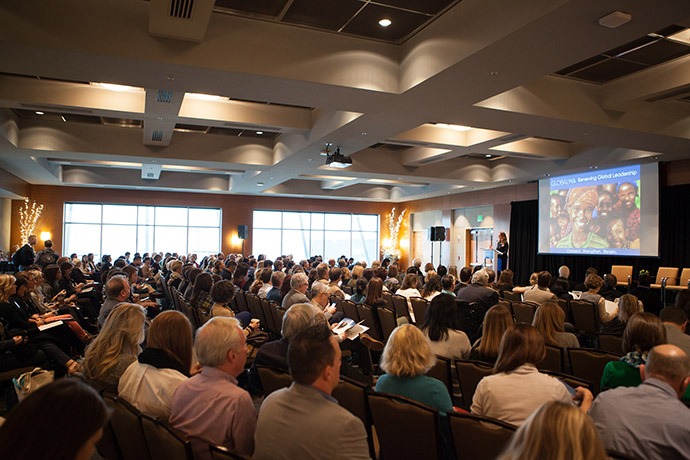
Photo: Opening remarks at the 2017 Global Washington Conference
The 2017 Global Washington conference got underway just shy of the one-year mark of the Trump administration. The opening keynote discussion, moderated by Akhtar Badshah, Chief Catalyst at Catalytic Innovators Group, included leaders from the nonprofit, for-profit, and academic sectors.
Richard Stearns, President of World Vision U.S., began the discussion of what it means to be a global leader by underscoring the sudden and seismic shift in international leadership. Today, he argued, the U.S. has stepped back from its historic leadership role.
“We are at a critical inflection point for development,” he said. “We can eliminate extreme poverty by 2020, but we need the leadership to do it.” Noting that leadership abhors a vacuum, he emphasized there are other actors who will rush to fill it if we do not.
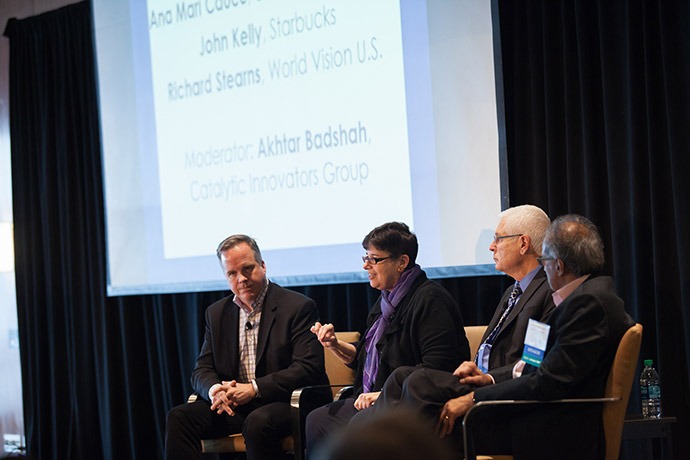
Photo: John Kelly (Starbucks), Ana Mari Cauce (UW), Richard Stearns (World Vision U.S.), Akhtar Badshah (Catalytic Innovators Group).
“The real leadership challenge is to swim against the tide of nationalism and isolationism,” said Stearns. And one of the most effective ways to do that, he argued, is by changing the narrative through telling stories about the lives of individuals and families that humanize them, and help us see our common humanity.
Digging further into what it means to be a leader, Ana Mari Cauce, President of the University of Washington, noted that she teaches a freshman seminar every other year, the most recent of which focused on leadership. Rather than emphasize individual leaders, Cauce said, “A lot of what we talked about was the process of leadership, because we are all leaders.”
A Latina and a lesbian, Cauce says she grew up “leading from the margins,” which turned out to have advantages. When leading from the margins, she said, you can do things that you can’t when you’re leading from the middle – where you have to be more of a moderator.
Asked how she achieved her own leadership position, Cauce says it sounds simple, but the key is to “say ‘yes’ a lot” when new opportunities and challenges arise.
Cauce is looking to the future, to the challenges and opportunities the next generation will inherit. “We want our students to think of themselves as global citizens and therefore global leaders.” There is a false dichotomy in framing Washington state issues versus Global, Cauce said. “If you want to do the right thing for Washington, you’ve got to think globally.”
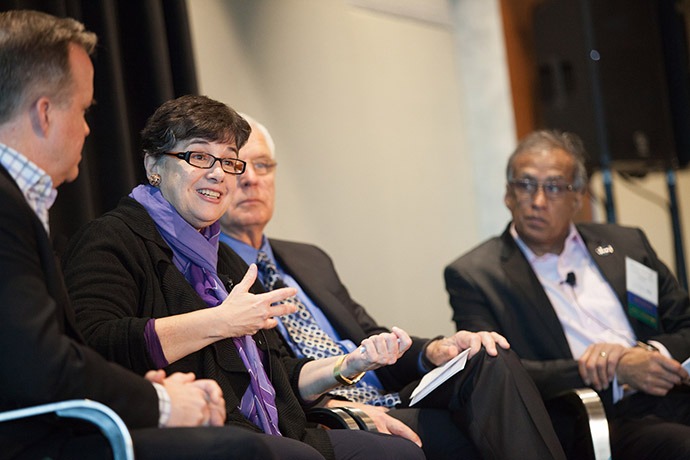
Photo: John Kelly (Starbucks), Ana Mari Cauce (UW), Richard Stearns (World Vision U.S.), Akhtar Badshah (Catalytic Innovators Group).
To illustrate his perspective on the role of corporate leadership, John Kelly, Senior Vice President of Global Public Affairs and Social Impact for Starbucks began with a story from his first day on the job at Starbucks four years ago. It was in late 2013, during a contentious federal government shutdown.
Kelly recalled he was standing in line, waiting to order a coffee, when someone poked him on the shoulder. It was Howard Schultz. Schultz said to him, “Can you believe this government shutdown? What do you think about that?”
Kelly responded that he used to work in government, and he felt it was a failure of partisanship and a national embarrassment.
Kelly will never forget what happened next. “He looks at me, and he pokes me in the chest, and he says, ‘What are YOU going to do about it?’ and he walks away.”
The exchange forever altered Kelly’s expectations of what corporate leadership means. Be it a failure of local, state, or federal government, the crises we face demand that we re-imagine what it means to be a leader.
Starbucks is guided by the question, “What is the role and responsibility of a for-profit company?” They believe it is about creating opportunities, Kelly said. In early 2017, Starbucks announced that it would hire 10,000 refugees around the world. “When our country rolled up the welcome mat to refugees, we took a different approach. We offered refugees a job.”
Yet, as Kelly emphasized, “It’s not charity; it’s good business.”
Along similar lines, Cauce shared a quote she often refers to from Eric Lui, co-author of the book, Gardens of Democracy: “We are all better off when we are ALL better off.”
The call to action for leaders is to recognize that self-interest is incomplete without accounting for the broader interests and needs of our communities. And to Stearns’ point about storytelling, we cannot really understand those needs until we begin seeing one another as people, not as faceless groups.
“When we label people, we diminish them,” Stearns said. “These are not issues; they’re human beings.”
Back to Top
Fast Pitch
Following the morning keynote discussion, representatives from seven Global Washington non-profit member organizations had the opportunity to pitch their organizations’ missions to the audience. The challenge? They had just two minutes in which to do it.
This year’s Fast Pitch included live audience polling to determine an “Audience Choice Prize.” In what turned out to be a very tight race, Amplio (formerly Literacy Bridge) was awarded three free tickets to next year’s conference.
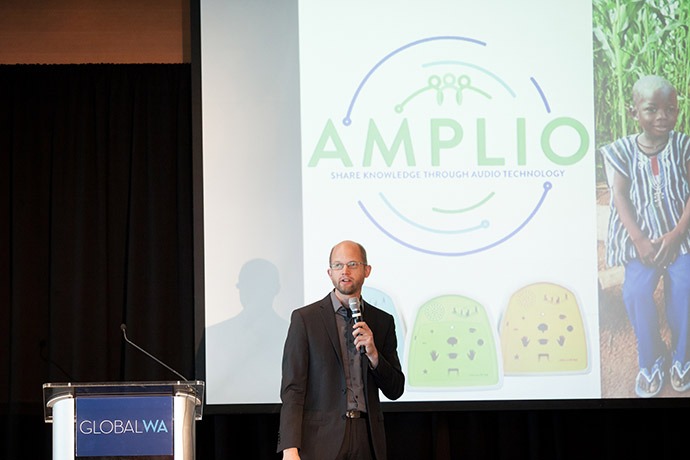
Photo: Cliff Schmidt, founder and executive director of Amplio (formerly Literacy Bridge).
Fast Pitch participants included:
- Joanna Bargeron, Vice President, Ashesi University Foundation
- Chris Collins, Executive Director, West African Vocational Schools
- Steven Kussick, Board President, Burkitt’s Lymphoma Fund for Africa
- Ferdouse Oneza, CEO, Spreeha
- Heidi Peterson, Executive Director, Mobility Outreach International
- Cliff Schmidt, Founder & Executive Director, Amplio
- Curtis Stuesse, Executive Office Manager, Mavuno
Back to Top
Corporate Leadership for Crisis Response
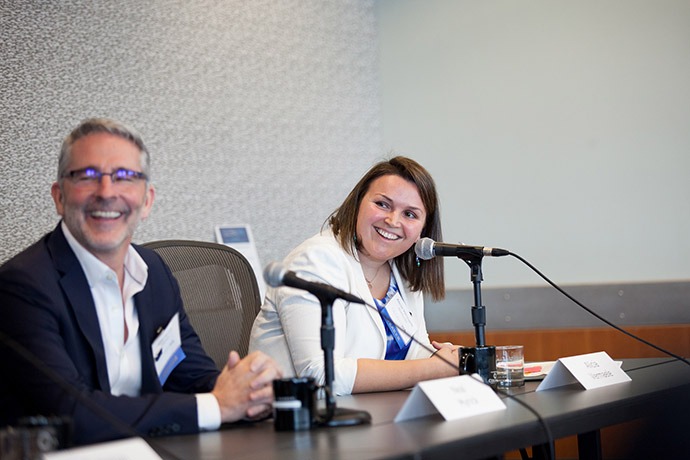
Photo: Neal Myrick (Tableau Foundation) and Alicia Vermaele (Starbucks) on a panel about corporate response to humanitarian crisis & natural disasters.
2017 has been a year of extreme natural and humanitarian disasters. As we look at leadership through the lens of concurrent and overwhelming natural and man-made disasters, from hurricanes in the U.S. and the Caribbean, to earthquakes in Mexico, to the ongoing refugee crisis around the world, the need for immediate relief and recovery is immense. Increasingly, companies are taking bold steps to respond to crises, and helping communities brace for the future.
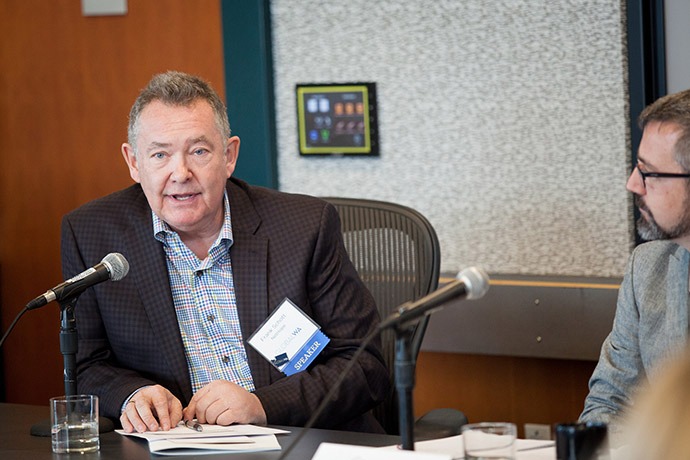
Photo: Frank Schott (NetHope) moderated the panel on what Northwest companies are doing to respond to global emergencies
Schott, Vice President of Global Programs at NetHope, led an interactive discussion between the audience and a panel representing leading Northwest companies: Starbucks, Microsoft, and Tableau.
“When emergencies hit, we try to think strategically so we look for a way to leverage our stores,” Alicia Vermaele, Senior Manager of Social Impact at Starbucks said. Starbucks stores are often a go-to meeting place, a “third place” where people go to connect with their loved ones.
According to Cameron Birge, Humanitarian Response Manager for Microsoft Philanthropies, Microsoft’s emergency service teams have been overwhelmed by the number of humanitarian missions they have undertaken this year. And Birge said he expects the trends to continue.
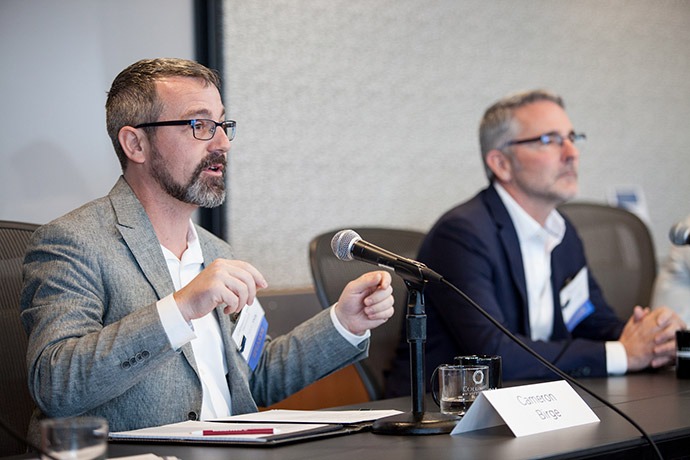
Photo: Cameron Birge (Microsoft Philanthropies) and Neal Myrick (Tableau Foundation) on the “Corporate Leadership for Crisis Response” panel.
addition to responding to natural disasters, Microsoft Philanthropies also has been working for several years to help Syrian refugees. These efforts include a focus on education, digital skills training, and software tools.
Starbucks, too, has stepped up in support of refugees with its promise in early 2017 to hire 10,000 refugees globally by 2022. This builds on the company’s 2015 commitment to support refugees by using digital platforms to raise funds for crisis relief organizations. Customers can use an app to donate by rounding up the dollar amount at the point of sale.
From a disaster preparedness standpoint, Neal Myrick, Director of the Tableau Foundation, talked about the company’s capacity-building project in Myanmar that strengthened data gathering and mapping skills prior to the crisis in Rohingya State. Myrick noted that you cannot eliminate emergencies, but if you have the right infrastructure set-up beforehand, it can enable a quicker and more sustainable response.
Looking to future crises, all the leaders agreed that preparedness is key.
Back to Top
Survey Says…
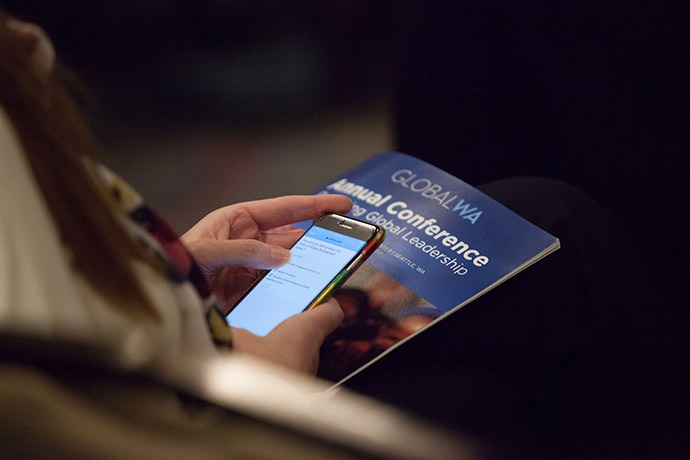
Photo: Participant at GlobalWA conference using the app for a live poll.
Participants at this year’s conference made extensive use of a smartphone app called Whova to take part in live polling throughout the day, results of which fed into ongoing discussions.
So what did we learn?
To start things off, Global Washington’s Executive Director Kristen Dailey asked how many of the conference-goers had attended previous Global Washington conferences. An astonishing 50 percent of respondents said that this was their first conference. More than a third reported having attended between two and four conferences before, and over ten percent had attended five to eight conferences in the past.
A highly dedicated five global development wonks reported having attended all nine Global Washington conferences.
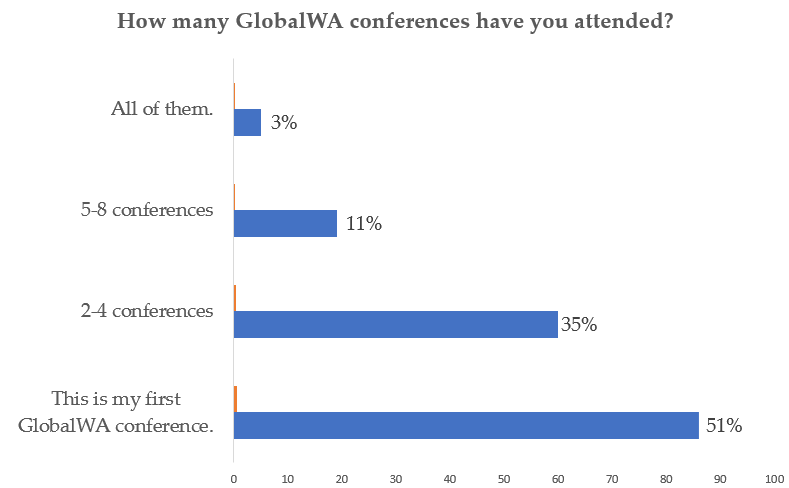
A poll later in the day found that conference attendees were feeling generally upbeat about the current state of global development. 69 percent said they felt optimistic, and expected that progress would continue to be made. Nearly a quarter held a more neutral stance, saying they were taking a “wait and see approach.” Only seven percent reported that current challenges have begun impacting their work.
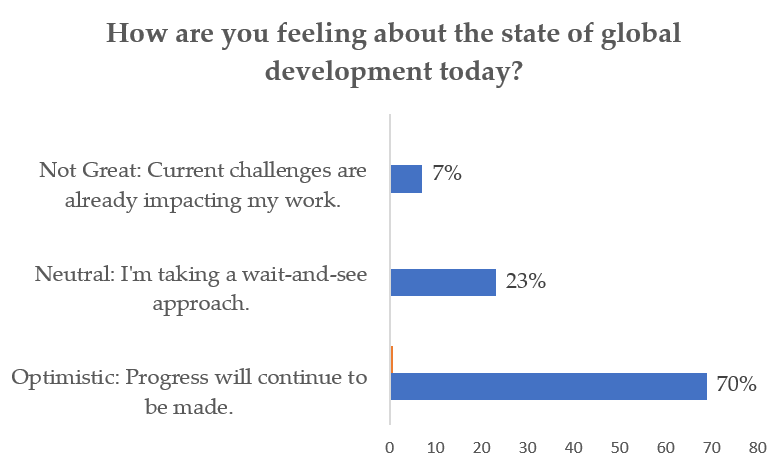
Back to Top
Love, Trust and Fear: Smart messaging to defend U.S. development assistance
“Foreign assistance is part of a broader conversation about America’s place in the world—what it means for America to lead,” said John Glenn, Policy Director, U.S. Global Leadership Campaign (USGLC).
Now, more than ever, visionary leadership is needed to buttress foreign aid funding against a brisk current of global disengagement. Glenn was among a panel of experts, including other leaders from the Bill & Melinda Gates Foundation and World Vision U.S., discussing ways to counter growing isolationist sentiment in America.
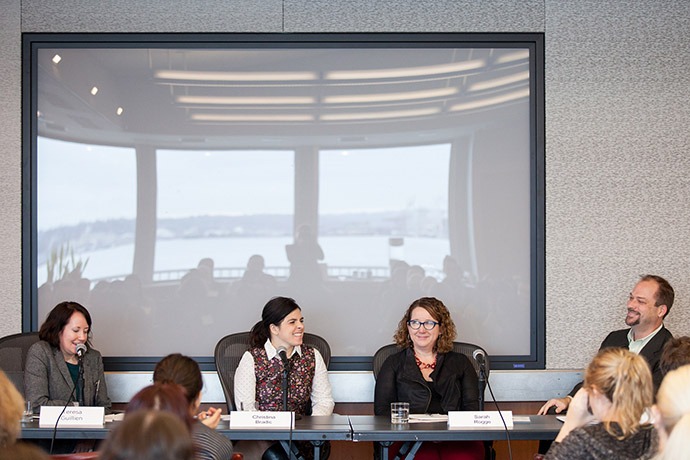
Photo: Teresa Guillien (Resource Media), Christina Bradic (World Vision U.S.), Sara Rogge (Bill & Melinda Gates Foundation), and John Glenn (U.S. Global Leadership Coalition) on a panel about making the case for development assistance.
The panel moderator, Teresa Guillien, Managing Program Director for Resource Media, focused the conversation around how organizations, businesses, and advocates can work together and speak with one voice, while using effective messages, and messengers, to change the narrative and build sustained support for development assistance.
A robust messaging strategy demands careful consideration of the intended audience. It’s also important to remember that there are pervasive myths surrounding foreign aid. One example: While foreign aid makes up less than 1 percent of the U.S. budget, most believe the figure is closer to 25 percent.
So how do we build empathy, dispel misperceptions, and communicate the urgency in which foreign aid is needed? Christina Bradic, Policy Communications Manager of World Vision U.S. acknowledged that her faith-based organization—traditionally supported by conservative evangelical Christians—has an audience that carries great influence with the current administration. World Vision U.S., she said, is proactively working to bring its audience on board to support foreign aid.
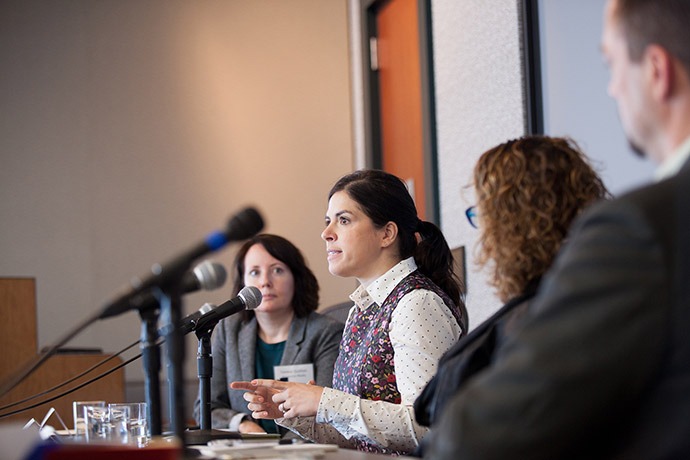
Photo: Teresa Guillien (Resource Media), Christina Bradic (World Vision U.S.), Sara Rogge (Bill & Melinda Gates Foundation), and John Glenn (U.S. Global Leadership Coalition) on a panel about making the case for development assistance.
“It’s a balance of speaking to this audience and educating them about the issues,” she said, adding that World Vision U.S. is also engaging local pastors and providing them with messages to take to Congress.
Bradic also highlighted the organization’s investment in research to illuminate how audiences view foreign assistance, and how to use these insights to develop messages that would resonate with them. Some of the more effective messages included a focus on building independence within local communities, using foreign aid as a tool to build partnerships, and enabling the shared value of doing good. World Vision has discovered that messaging is most effective when the audience identifies with the person who needs aid, seeing them as “people like me.”
The panel agreed that there was great strength in storytelling to connect an audience with possibility and the prospect of being a changemaker. “We tend to be evidence and data-influenced,” said Sara Rogge, Deputy Director of Global Policy & Advocacy at the Bill & Melinda Gates Foundation. “But we realize that a variety of tools need to be used. How do you pair evidence and data with a compelling story?
What about the decision-makers in government who have the power to change policy? It is highly valuable to invest in and empower them.
“We commit our leadership voice to this effort and are continually thinking about how we influence the U.S. Government as they allocate resources to development issues,” Rogge said.
Glenn concurred: “From my perspective, our theory of change is engaging decision-makers.”
Back to Top
Harnessing the Power of Technology to Build NGO/Corporate Partnerships and Sustainable Development Solutions
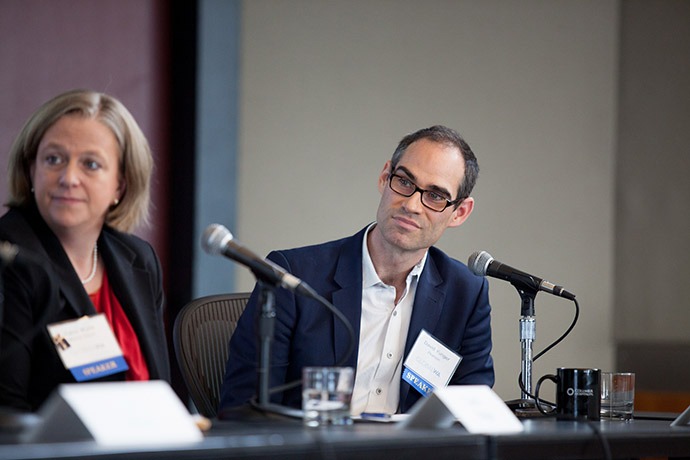
Photo: Carol Wylie (World Vision U.S.) and David Yunger (Pearson) on a panel discussing NGO/corporate partnerships that leverage technology.
Pressing global health and development challenges demand a fresh approach to leadership. Market forces and globalization require creative collaboration across sectors. This comes at a time when corporations both have a unique role to play and face a mandate to be good corporate citizens.
“Today more companies are getting involved with SDGs (Sustainable Development Goals) and shared value, often through marketing and communications work,” said Kirsten Gagnaire, Managing Director of FSG. “Companies can and do want to do more to leverage assets for social impact.”
Gagnaire led the panel discussion, probing the dynamics of cross-sector partnerships. The panel consisted of leaders with vastly different backgrounds, which allowed them to explore the various roadblocks companies face when engaging in the global development space.
It was also an opportunity to compare and contrast the strengths that businesses and non-profits each bring to the table.
“Do the work together and find the roadblocks as you go,” suggested Skye Gilbert, Deputy Director of Digital Health Solutions at PATH. “We invest in spending one-on-one time with new partners because this is better for trust-building, even if this process is not always efficient. We are very humble about what we are NOT good at, which makes us more open to partnering with someone who does it better.”
The conversation also touched on negotiating and establishing successful multi-stakeholder partnerships, as well as how to move from a “handout” to a “handshake.”
David Yunger, Vice President for Microsoft Business at Pearson, explained, “I work on the business side, and we are held accountable to a bottom line. So, if we stop at donations, in-kind or other, that misses something. So, how can the private sector work to help problem solve? Start with…what are the problems? A one-off donation stops there, but if you work it into core of business, it becomes natural.”
“In a good partnership, we can educate a business on the issue and then we can help them communicate a better understanding of the root of the issue,” said Carol Wylie, Vice President for Corporate Engagement at World Vision U.S. “Companies are more willing to listen to an NGO from a spirit of solving a problem, rather than criticizing businesses for what they are doing.”
Among the main threads to emerge from the discussion was the critical need to build technology and social responsibility into the core culture of a company, because only then does it feel and become natural. And when companies and non-profits come together, they must first discover mutual goals and work as “business partners.”
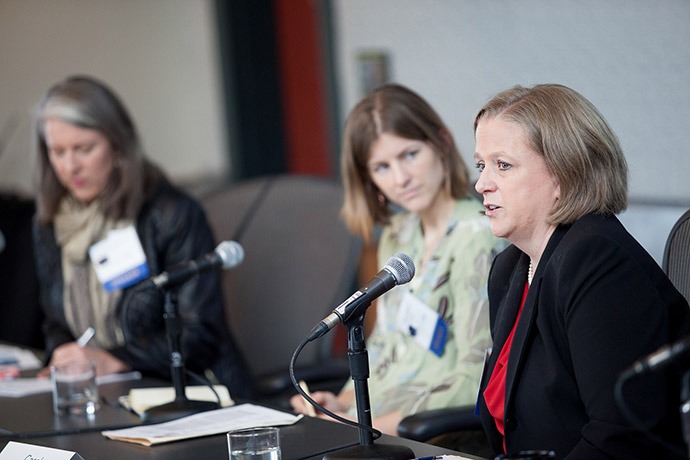
Photo: Kristen Gagnaire (FSG), Skye Gilbert (PATH), and Carol Wylie (World Vision U.S.) discuss successful partnerships that leverage technology.
“I am a big fan of ‘shut up and get to work,’” Skye Gilbert joked, reaffirming the overall conclusion that once mutual priorities are understood among all partners, great progress and impact can be made.
Back to Top
Searching for—and Finding—Evidence of Impact
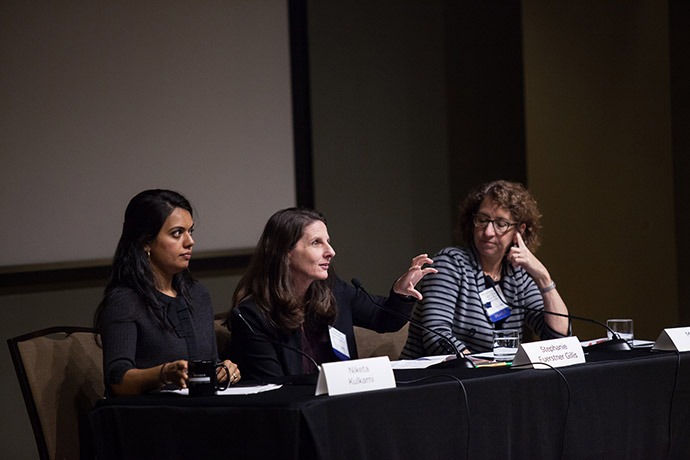
Photo: Panel on “Searching for—and Finding—Evidence of Impact.”
we are in the midst of the largest transfer of inter-generational wealth. Experts estimate that $20 trillion will be directed towards nonprofits.
“How do we influence those dollars for greater impact and how do we give it the greatest value for society?” asked Stephanie Fuerstner Gillis, Senior Advisor on the Impact-Driven Philanthropy Initiative for the Raikes Foundation.
This question was at the heart of the panel of policy experts and monitoring and evaluation (M&E) practitioners, who explored how we can enhance the relationship between donors and grantees, and address the disconnect that exists between impact and funding.
Perhaps it starts with how we define impact, said panel moderator Mary Kay Gugerty, a professor at the Evans School of Public Policy and Governance at the University of Washington.
“Impact” has become a loaded term, as it is often synonymous with “the silver bullet…a life-changing revolution at almost no cost,” said Niketa Kulkarni, Senior Research and Evaluation Specialist for Landesa.
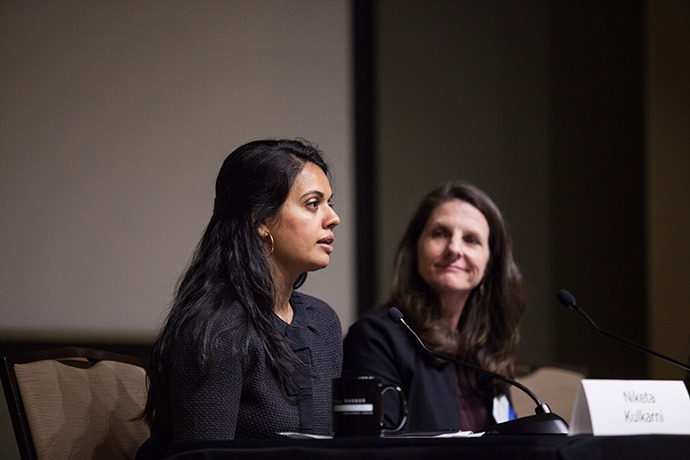
Photo: Niketa Kulkarni (Landesa) and Stephanie Gillis (Raikes Foundation) speak about program impact evaluation.
“A more responsible way of looking at impact is to evaluate whether we are moving towards the outcome that we desire.” Kulkarni pointed to the rise of microfinance nearly a decade ago. It was once heralded as a silver bullet for alleviating poverty. “We now know we need mechanisms in place to support microfinance,” Kulkarni said.
Measuring impact runs against a number of challenges: the duration of grants, unrealistic expectations and data collection, which is expensive, time consuming and a burden for smaller organizations. M&E, which is usually implemented at the end of a project, doesn’t always deliver a clear picture.
Gugerty suggested an additional strategy: “Map out your theory of change,” she said, and identify the short-term outcomes as you move toward a long-term goal.
The panel agreed it is important to be wary of the tendency to lean into “sexy statistics” at the cost of truly sustainable solutions.
How can M&E be aligned with the realities on the ground? Is it really possible to demonstrate impact for a broad project funded with just a two- or five-year grant?
There are clear benefits to developing reporting mechanisms early on and also expanding the language around M&E to reflect the ultimate goal, e.g. monitoring, evaluation, and learning; or monitoring, evaluation, and accountability.
Each panelist agreed that we could amplify performance and impact with collaboration and shared platforms, including a common theory of change. Landesa has readily adapted the idea of shared platforms, Kulkarni noted, drawing from modules developed by other organizations working in food security and women’s empowerment. “Financial resources are limited and we need to leverage what has already been done,” she said.
Back to Top
Failing Forward: Learning from Responses to Epidemics
The threat of global pandemics is ever-present in the global health and development context. The Zika and Ebola outbreaks of recent years provide important guideposts to direct our preparedness efforts for future pandemics.
Erin Stucke, Program Officer working on malaria at the Bill & Melinda Gates Foundation, led a breakout session focused on evaluating global preparedness to date, and the importance of the UN International Health Regulations as a mechanism to avert future threats.
Where are we now? Stucke outlined a number of benchmarks, such as centralized laboratory models, the ability to leverage new technology appropriately, vertical data integration, capacity-building, risk communications, and advocacy efforts.
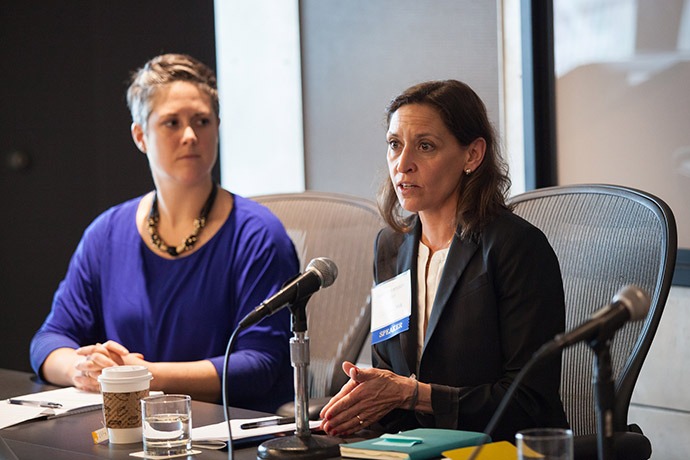
Photo: Erin Stuckey (Bill & Melinda Gates Foundation) and Sumi Paranjape (Vulcan) on a panel about global health preparedness.
The three panelists agreed that data plays an important role across the spectrum of a well-coordinated response. Sumi Paranjape, Director of Technology Innovation for Vulcan, cited a recent outbreak in the Democratic Republic of Congo as evidence that vertical data integration is improving.
“People were prepared, they had the data and the vaccines, they were able to stop the epidemic in seven weeks,” Paranjape said.
When it comes to capacity-building, however, Paranjape suggested a different approach. “For example, how do we start to democratize the technologies that allow us to test and confirm the diseases as they are occurring and share data with a regional lab?” she asked.
When we consider data—and the ability to share it broadly— there are a number of powerful resources at hand, said David Pigott, Assistant Professor at the Institute of Health Metrics and Evaluation.
“Together they allow us to look at epidemics from every point of view, creating a full picture,” he said. “But there is one missing piece, the translation of models and data to the work on the ground.”
As an example, Pigott pointed to the promise of mobile phone data sharing in the field. “At the population level, it is difficult to know the patterns of how people are moving. Also, it’s very difficult to tease apart within big data what is most important.”
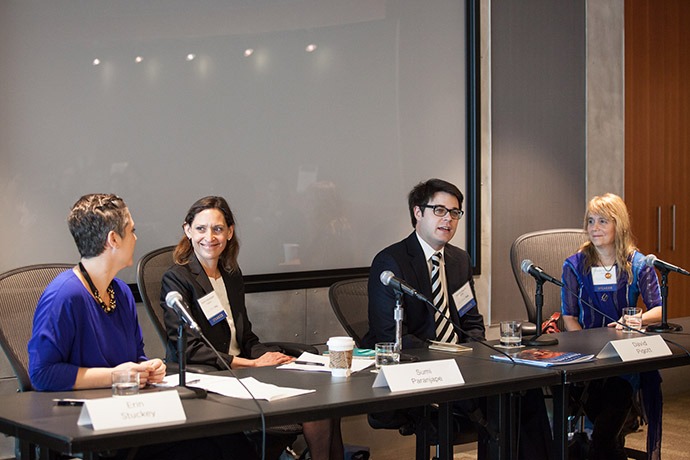
Photo: Erin Stuckey (Bill & Melinda Gates Foundation), Sumi Paranjape (Vulcan), David Pigott (IHME), and Linda Venczel (PATH) on a panel about failtures in global health preparedness
Aligning all the essential components for the ideal global warning response system is no small task. Panelists agreed it takes rapid reporting, stronger health systems and national labs, a robust health workforce on the ground, a functional mechanism for emergency operations, and reliable transportation and supply chains. The panel put an emphasis on stronger disease surveillance, and data sharing across nations, borders and among all stakeholders engaged in the response. Further, emergency operation centers, a centralized decision-making process in each country, and the human resources to respond are also vital.
Delving into the role of vaccines in pandemic preparedness, Linda Venczel, Director of the Global Health Security Project at PATH, highlighted the Coalition for Epidemic Preparedness Innovations (CEPI).
“CEPI is the new GAVI,” she said referring to the Global Alliance for Vaccines and Immunizations. “They have begun to pool resources and mitigate risks, so that the private sector will feel more comfortable to invest in vaccine development.”
CEPI has already identified eight epidemic diseases for vaccine development, she said, pointing to a vaccine success story: the successful treatment of yellow fever in Ghana.
In addition to the need to develop effective vaccines for emerging diseases, there’s another challenge to global health on the horizon. “I would also argue that climate change is a natural disaster that will impact epidemics,” Venczel said, “so this is an important cross-section.”
Back to Top
Lunch Plenary: Alaa Murabit
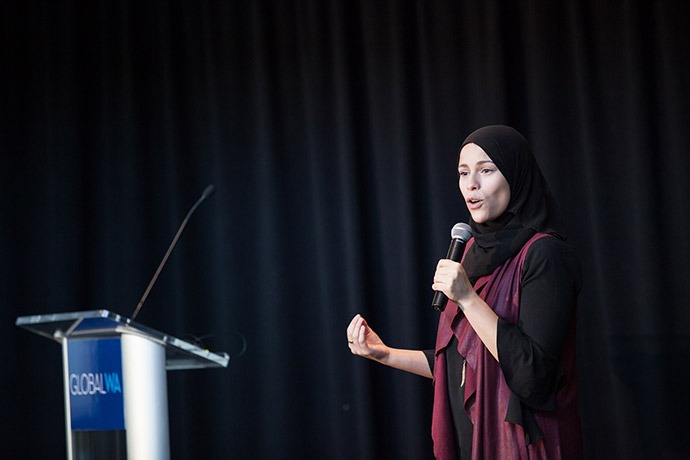
Photo: Alaa Murabit, Ph.D., lunch keynote speaker at the GlobalWA conference.
There are number of lenses through which we can define leadership. Who is head of the household? Who has the power to determine the social and cultural norms in the community? Who will take charge of safety and security in an emergency? Who will secure economic prosperity for all? And who has a voice at the table to broker peace and rebuild a nation?
These questions came to the fore during a lunch discussion with Alaa Murabit, Founder of The Voice of Libyan Women and United Nations High-Level Commissioner on Health Employment & Economic Growth. Her unique journey as a feminist physician, global security strategist, and fearless leader is founded in two drastically different cultures. She grew up with one foot firmly planted in the bucolic Bible belt of Saskatoon, Canada, the other in Libya’s political upheaval; one a majority Catholic community, the other distinctly Muslim.
“Women have been told what their place is, regardless of culture and context,” Murabit remarked. Ironically, she quipped, in any given household, the women are the leaders with a reach that extends deep into neighboring households, schools, community, and religious organizations.
Murabit was in her fifth year of medical school when the Libyan Revolution broke out, and she was inspired by the decision-making role women claimed in the movement. She sought to harness the inherent interconnection women possess and put it to work for the future of her country. So she founded The Voice of Libyan Women, a nonprofit dedicated to empowering women in civil society, politics, and policy. She was just 21.
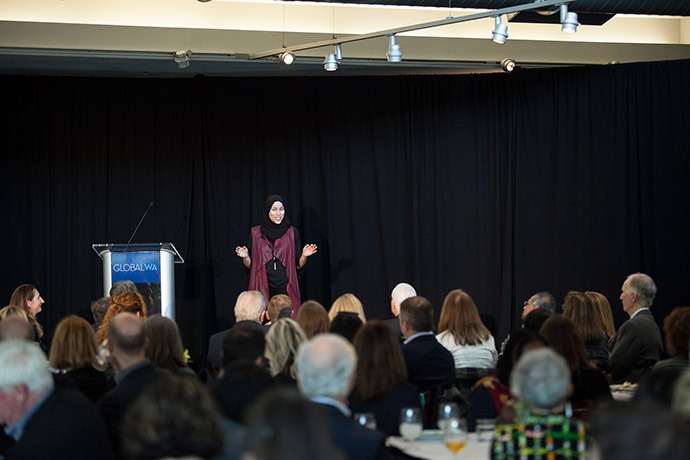
Photo: Alaa Murabit, Ph.D., lunch keynote speaker at the GlobalWA conference.
“We need a new definition of leadership,” Murabit asserted. Forging peace from Libya’s political turmoil would depend on inclusion and empowerment of women, she said. “Without women at the table, the risk of failure is high—90 percent in the first five years.”
She went on to mobilize the Noor network, using Qur’anic scripture to advance the voice and position of women in Libya. Once being granted the stamp of approval from Libya’s religious council, Murabit then gained access to all sectors, from schools to media and ultimately reaching two million people in a country of six million.
“When women have a seat at the nation-building table,” Murabit continued, “they place an emphasis on fundamental services, such education, health and infrastructure, which ultimately leads to greater stability and security.”
Murabit looked to her mother, who cultivated leadership through compassion and—most important—by listening. “Why don’t we hold our political and business leaders to the same standard?” she asked.
Then she turned to the future: What would happen if there were more women leaders? “If you educated and equally employed the women and girls in the world, we would have greater economic growth than China and India combined.”
She noted that education is directly tied to economic prosperity and avoiding conflict.
“We need to educate girls, because women reinvest 90 percent of their income into their communities,” she said.
Murabit also touched on privilege, philanthropy and the escalating migration crisis, which has led to an increase in child brides, slavery, and human trafficking. We are applying a Band-Aid solution to a crisis that demands strong and visionary leadership, she said. So she returned to the question of the day: What does it take to truly engage as an effective leader?
“Leadership is looking at what you can do with whatever action, capacity, monetary, time, you have and say ‘this is what I’m going to do in my own community.’”
Back to Top
2017 Global Hero Award
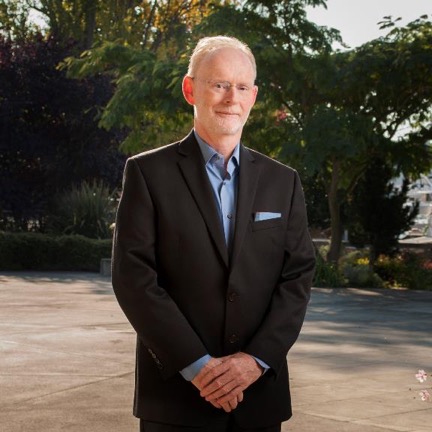
Photo: Tom Waldron, global philanthropist, as well as the founder and CEO of Waldron.
This year’s Global Washington Global Hero Award was presented to Tom Waldron, a global philanthropist, as well as founder and CEO of executive search firm, Waldron. Bill and Paula Clapp presented the award in memoriam to his brother, Dennis Waldron.
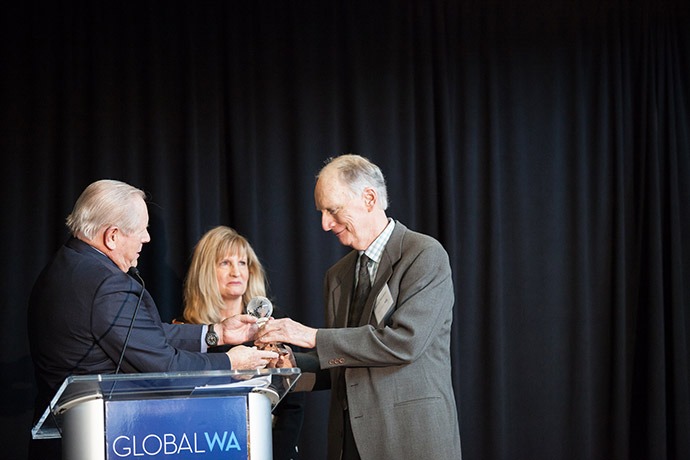
Photo: Bill and Paula Clapp present the GlobalWA Global hero award to Tom Waldron, in memoriam.
Back to Top
Business Leaders Take a Stand for the Global Goals
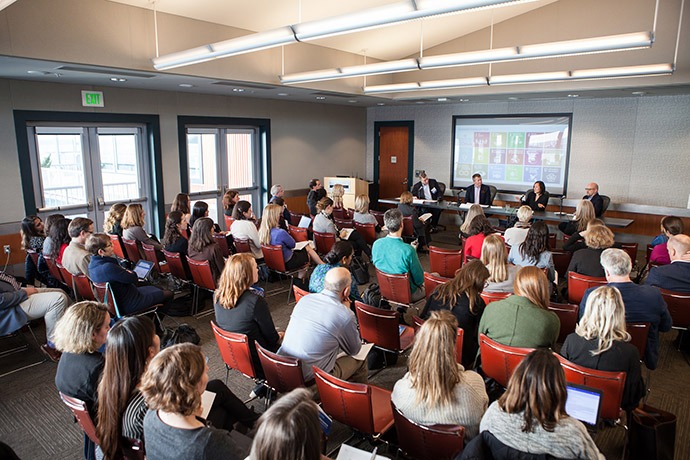
Photo: Panel Session, “Business Leaders Take a Stand for the Global Goals.”
As we work our way toward the Sustainable Development Goals (SDGs), the private sector has an essential role to play. Yet business needs a thriving world to function, reaffirming Eric Lui’s maxim “We are all better off when we are all better off.”
While companies increasingly understand that incorporating SDGs into a corporate and global strategy is important, some companies still struggle to make them part of their corporate culture and structure. In a 2015 PricewaterhouseCooper (PwC) survey, only 13 percent of participants could identify specific tools for using SDGs for company progress.
James Bernard, Director of Technology for Development at SSG Advisors, led a conversation among representatives from the private sector. Together, they explored how to make global development goals a part of the overall business strategy and how the SDGs are guiding corporate engagement.
Some argue that companies take on SDGs as a marketing effort under a different cloak. Bernard noted that the question is often whether business or philanthropy is driving the SDG initiatives within companies. It can be both, said Clinton Moloney, Managing Director of Sustainable Business Solutions at PwC.
“Right now, many companies are ‘cherry picking’ SDGs based on what goals are unintentionally already underway within the company,” he said. “Other companies are being very intentional about selecting goals, approaching the selection not just from a philanthropic perspective but also a business perspective.”
Katherine Cheng, Head of Global Corporate Citizenship and Community Relations at Expedia, concurred and offered insights from the world’s largest travel company.
“Today a CSR program does not cut it. Instead, this needs to be part of the overall business strategy,” she said, adding that Expedia is focused on eight SDGs, based on the size of the company and offices around the world. “SDGs provide focus for corporate goals, so we picked SDGs to make a business case, which allow us to have a focus and employees are much more engaged.”
Microsoft has set a global theme which cascades down regionally, explained Steve Lippman, Director of Corporate Responsibility at Microsoft.
“We let regions pick local partners. For example, our corporate philanthropy is about empowering youth for different opportunities. But then we let India, China, or others select the actual partners that they want to work with.”
The panel agreed that there is a lot to consider in SDG selection. What is important to the organization and to stakeholders? What can have the greatest impact in different regions? “Eventually it all comes down to leadership,” concluded Clinton Moloney. “What is the company willing to stand up for?”
Back to Top
Authentic Leadership Development
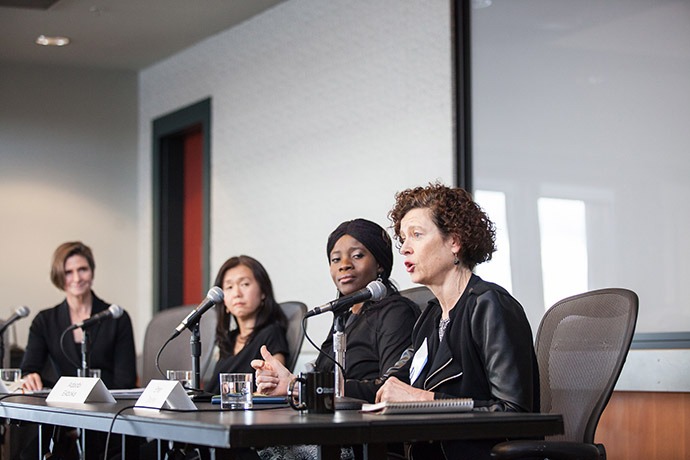
Photo: Panel session, “Authentic Leadership Development.”
“We need to realize that there are people in the community who understand the local culture and the dynamics,” said Adaobi Egboka, Executive Programs Director at the Legal Defense and Assistance Project. “We need to listen to these people before we hear ourselves.”
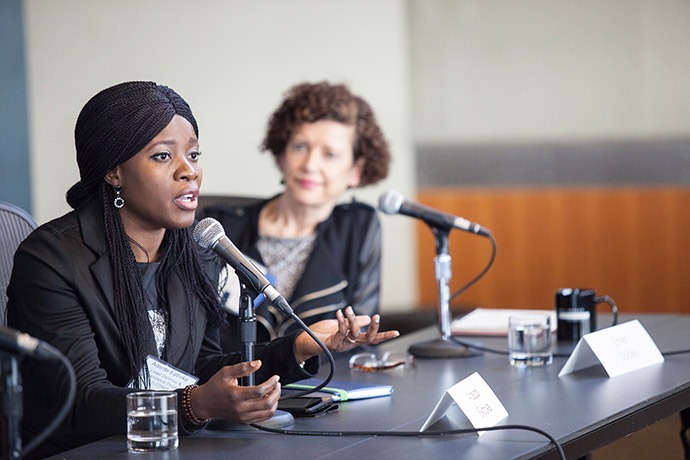
Photo: Adaobi Egboka, Executive Programs Director at the Legal Defense and Assistance Project.
Egboka’s statement reflects a clear shift in how NGOs engage with the communities they serve. At such a critical moment in the broader global development agenda, visionary and effective leadership is most needed from the communities themselves and from the bottom up. Dena Morris, President & CEO of the Washington Global Health Alliance moderated the panel discussing best practices for capacity-building and how NGOs can better empower, cultivate, and mentor leaders.
What does authentic leadership development look like in Africa, where only six percent of the college-eligible population has the opportunity to attend university? They are the future leaders. But they also need great courage to change an entire continent, constrained by a weak educational system and riddled with corruption, explained Emer Dooley, Vice-Chair of Ashesi University Foundation.
“We want to give the students the passion to build their country,” she said, but first, they must rise above a system of rote learning to become critical thinkers.
Izumi Yamamoto, Director of Learning at iLeap, described how her organization works together with community-based social justice leaders, from the executive director level to the community leader who has no official title. To mentor leaders, she suggested, it is critical to facilitate opportunities that allow community members to learn from one another.
“People don’t need more skills and information, they need a space to find meaning in what they are doing,” she said. It is also important to have an approach that allows you to tap into the leadership expertise in the community.
The panel agreed that to create the next generation of leaders, the most important message is: leadership matters. Yet it will require funding K-12 and higher education.
“No one is talking about funding the institutional leadership deficit,” Dooley pointed out, with general agreement among the panelists.
Back to Top
Data Defense: Protecting Donor & Beneficiary Privacy
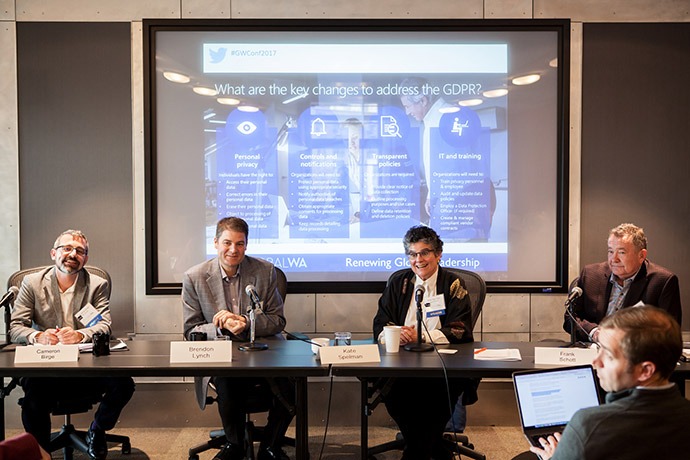
Photo: Panel on “Data Defense: Protecting Donor & Beneficiary Privacy.”
We have become increasingly aware that no organization, business, or sector is immune to data breaches. In May 2018, the European Union will launch the General Regulation on Data Protection (GRDP), which will provide a new framework for an organization’s use of personal information, including employees, donors, and beneficiaries, no matter where they are located.
The GRDP has yet to garner the attention it requires, said Cameron Birge, Humanitarian Response Manager for Microsoft Philanthropies, who led the session. And non-profits are grappling with the challenge of convincing donors to support the increased costs associated with greater protection and controls. So how are they preparing themselves to adhere to this new framework and the significant penalties they may face for non-compliance?
“The biggest potential breach is beneficiary data, thus harming the reputational risk of a nonprofit,” stated Frank Schott, Vice President of Global Programs for NetHope. Most non-profits don’t have the underlying capital to absorb the financial penalties of a data breach, he added, underscoring the challenges that exist when a nonprofit shares data with an implementing partner. However, the regulations are slightly vague, Schott continued, and therefore open to interpretation. “We advocate that federated and non-federated NetHope members work together to define a way forward, and then use that consensus as our North Star.”
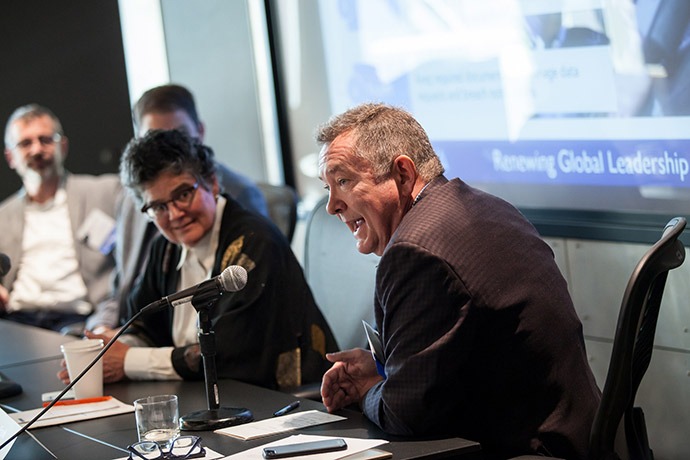
Photo: Panel session, “Data Defense: Protecting Donor & Beneficiary Privacy”
Katherine Spelman, Shareholder at Lane Powell PC, suggested that small- and medium-sized organizations would benefit from board engagement to prioritize GRDP. “It has to be a part of the fiber of the organization,” she argued.
Many NGO country offices still work in a paper environment, adding another layer of ambiguity to the new regulations. Yet the prospect of a massive breach should reinforce the need to have systems, policies, and practices in place that represent good faith in compliance, said Brendon Lynch, Chief Privacy Officer at Microsoft, for there is much at stake: data is valuable.
“Organizations are increasingly effective because of data, so there is increasing value attached to data,” Lynch continued. “The new regulations will be requiring organizations to understand what data they have, how they use it, and what activities should be in place to mitigate the risk of a data breach.
“We talk about ‘privacy by design,’” Lynch added, noting that data privacy needs to be developed alongside program development, with consideration for what makes sense in a particular context.
Back to Top
Big Bets for Global Goals
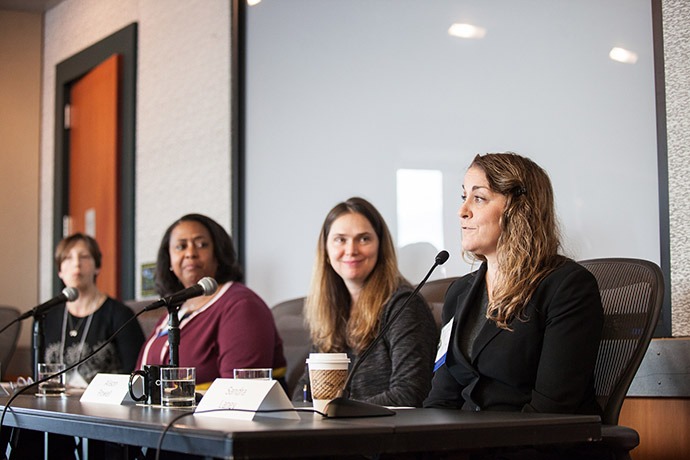
Photo: Panelists on Big Bets for Global Goals.
Some of the most intractable challenges we face require a significant influx of financial resources, and philanthropy remains a powerful vehicle to mobilize social change, said Elizabeth Dale, Assistant Professor, Nonprofit Leadership, Seattle University, who moderated the panel.
We are at a crossroads: New wealth continues to grow as does philanthropic giving. In 2016, giving by individuals, foundations, and corporations, reached an all-time high for the third consecutive year, with an estimated $380 billion dollars raised. Yet while 80 percent of the world’s largest donors say they prioritize making “big bets” ($10 million or more) for high-impact social change, their giving doesn’t always reflect this objective. Traditional institutions, such as hospitals or universities tend to get the lion’s share of gifts, 80 percent, with only the remaining 20 percent directed to social change.
Dale led the discussion exploring how to better understand donor intent, while also strategically guiding donors toward smarter giving practices.
The critical moment for non-profits to focus on big bets is now, said Alison Powell, Senor Director of Philanthropy at The Bridgespan Group.
“Donors and high-net worth individuals are transferring their wealth to the next generation,” she explained. “We see an important moment with our clients and how they can drive change.”
Many large donors have aspirational goals, such as ending sex trafficking, eliminating malaria, or conserving wilderness areas. They want to make an impact, yet it’s difficult to measure change in the social sector. Meanwhile, big institutions are ready with a list of big bets, shovel-ready projects, such as a new university building or hospital wing.
So what does it take to be a big bet candidate? Lisa Ellis, Chief Operating Officer for Landesa, outlined her organization’s strategy.
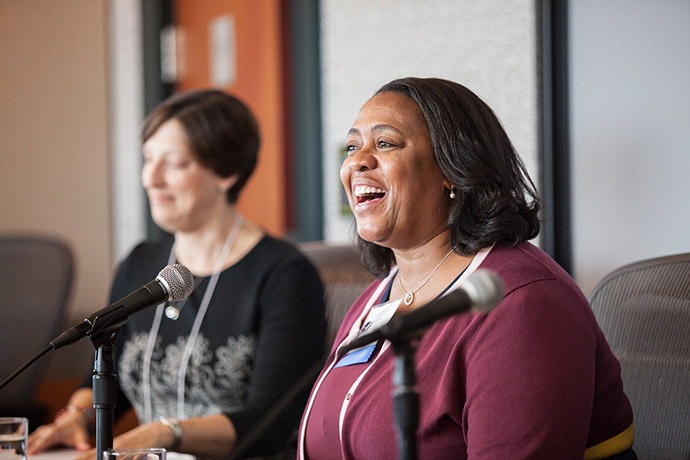
Lisa Ellis, Chief Operating Officer for Landesa, on the panel “Big Bets for Global Goals”
“Have a roadmap for where you want to go as an organization and be prepared for a long-term relationship, one that goes beyond money,” she said. This includes ensuring that stable leadership is in place. Be prepared to provide a seat on the board and demonstrate a willingness to make use of all the resources the donor has in place, she added. “Help your donor be a part of the movement that your organization is taking forward.”
Seattle has become nearly synonymous with big philanthropy. The Bill & Melinda Gates Foundation alone gives approximately $5 billion every year. Relationships are important, said Sandra Laney, Senior Advisor in Discovery and Translational Sciences for the Foundation, “But it’s also about developing a track record in a topic area of interest.” “Looking across all Foundation giving, 97 percent of funds were targeted to those we knew, such as GAVI and WHO.”
Laney pointed to the Grand Challenges program, which provides grants of $100,000 to fund early innovative ideas to solve key global health and development problems. “It’s open to anyone, anywhere and it’s a blinded review process, you don’t even need evidence,” she explained, “you just need to have a good idea.”
In the course of the audience Q&A, the panel identified additional considerations for landing a big bet. Does your approach take a new, promising tack? Has your organization provided a clear outline of the problem alongside a clear path to a robust solution? Does your solution align with donor funding interests? A key point to remember is that donors are not homogenous and they all have different preferences in how they want to be involved.
“Ultimately, the proposed big bet plan has to be big enough to matter, yet small enough to be believed,” Powell concluded.
Back to Top
Afternoon Keynote
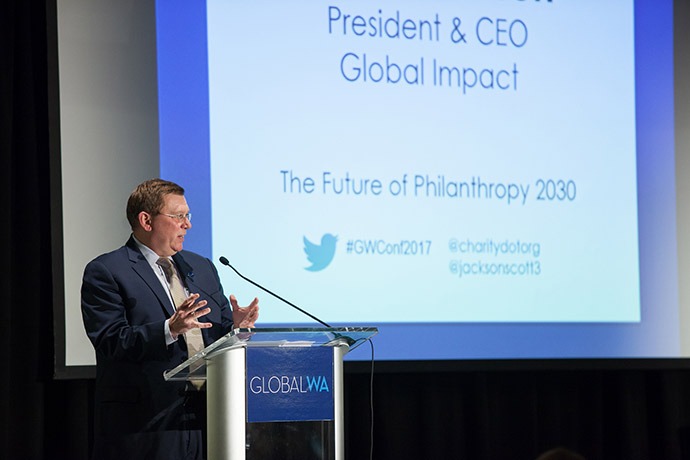
Photo: Scott Jackson, CEO of Global Impact.
Inclusive of all sectors, Global Washington is a supportive community with common goals. These goals reflect the value and the many benefits that interconnectedness delivers. Just as one SDG cannot be delivered without another, we all have to be in it together, and together, we’re off to a strong start.
Working as partners and collaborators, we are all global citizens with a legacy to leave behind. How can we tap into the most impactful leader that resides inside each and every one of us?
In the closing keynote of the GlobalWA conference, Scott Jackson, CEO of Global Impact offered a simple, yet profound suggestion: Make it personal.
Delving into his own, deeply compelling journey, revealed in his newly released book, Take Me With You, Jackson examines the signposts that steered him toward a life of service in the nonprofit sector.
Jackson, a white, middle-aged executive, is the unlikely figure for a childhood steeped in racial discrimination, intolerance, and injustice. In the closing keynote address, speaking to his life-long colleagues, fellow practitioners and friends, Jackson shared his own, and very unconventional story of growing up in a racially integrated family.
The book recounts the unexpected twists in his young life as the son of a long-battered white woman who left her abusive husband and married an African-American pastor in a small Kansas community.
Leaping ahead to his early career in the nonprofit sector, Jackson recounted a trip to a small village in Uganda, a community in the grip of violence fostered by the Lord’s Resistance Army. In a tense moment, a tiny little girl grabs his hand and whispers, “Take me with you.” It was the same plea he had made as young child each time his mother fled the home and the violence of her abusive husband.
Be it the shadow of Jim Crow or Joseph Koney, Jackson reflected on the deep and painful imprint left upon so many lives, thousands of miles apart.
“My call to action to each of you is to connect to your own story and connect it to the change you want to see in the world,” Jackson said. “You need to choose your charity every day and remember that each of us has a journey that is not only important to us, but also to those around us. It helps us help others, and this is why you need a community like Global Washington – to connect with others.”
Back to Top
Closing Keynote Discussion
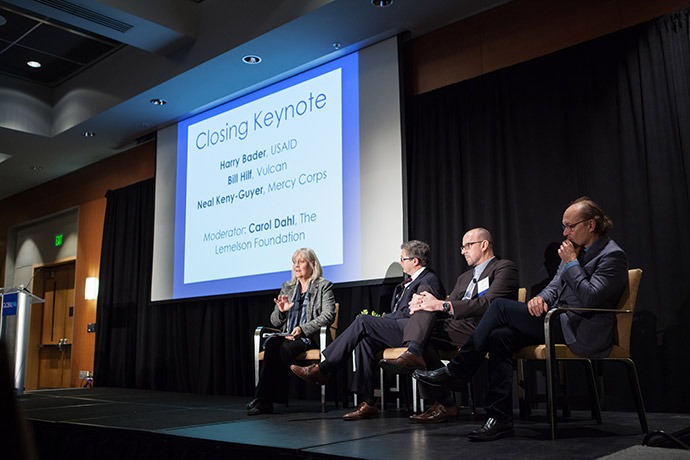
Photo: Carol Dahl (The Lemelson Foundation), Harry Bader (USAID), Bill Hilf (Vulcan), Neal Keny-Guyer (Mercy Corps).
“Disruption” is a word that enjoys great cachet on the global development agenda. So what kind of leadership is needed for true disruption when we find ourselves in very tumultuous times? Carol Dahl, Executive Director of The Lemelson Foundation, raised this question for the panelists in the closing keynote of the conference.
At Vulcan, it starts with the question “What if?” that is then backed by determination to change the arc of the problem while rejecting convention, said Bill Hilf, CEO of Vulcan. He outlined the highly charged engine at Vulcan that also drives the Paul G. Allen Foundation: an eclectic mix of philanthropy, real estate, technology and more. Stitch them all together, apply core organizational strengths, and you have Vulcan’s formula for disruption, Hilf said.
Hilf pointed to homelessness, ocean acidification, pandemics and other global challenges. They require systems thinking because technology alone won’t address the problem. “So we are looking for the bad actor—it could be a country, a system, a chemical—and then we use the ‘follow the motherboard’ approach.” Rip the problem apart and look at every single component in the value chain to understand the entire system.”
Hilf described the innovative use of satellite imagery to combat illegal fishing as an example. We build a technology-based solution in tandem with policy recommendations to have greater impact, he said, then “we use story-telling to illuminate it.”
To be truly disruptive requires us to acknowledge we face three significant trends in the world, said Harry Bader, Acting Executive Director of the U.S. Global Development Lab at USAID. “We’re capitalizing on two”—the revolution in digital technology and the shift to private sector capital flow—“to ameliorate the third,” which is extreme poverty, exacerbated by the digital divide.
The flip phone, for example, leads to financial inclusion in developing countries, as well as education and health programming, he said. These are the important opportunities to be had in mobile technology. Yet they could be undermined by two emerging, worrisome trends: corruption and conflict.
“Vertically integrated cartels, which include government, private sector and criminal rings, create almost an impenetrable problem,” Bader said, pointing to the rise of block chain, a promising technology that could transform business operating models and unravel the unprecedented complexity of corruption.
The rise of conflict and extremist violence has fundamentally altered the global development landscape. We grapple with an overwhelming refugee crisis. To be disruptive, we need to change our approach, said Neal Keny-Guyer, CEO of Mercy Corps.
We often focus on the “What,” Keny-Guyer said. But for leaders of impactful organizations, we need to turn this around. “What about the ‘How?’ How do you foster disruption in the organizational culture?” he asked.
It comes from a fearless embrace of innovation and risk. Leading an organization that is working on “last-mile” solutions demands an emphasis on thinking big and a willingness to borrow from successful organizations. Mercy Corps turned to Apple to train front-line leaders and to reinforce bigger thinking at every touch point, be it company culture, programs, incentives or awards.
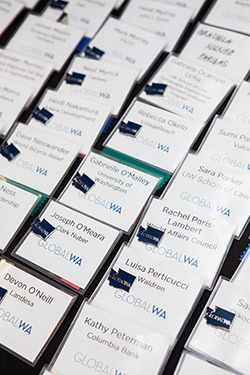
Back to Top
Welcome New Members
Please welcome our newest Global Washington members. Take a moment to familiarize yourself with their work and consider opportunities for support and collaboration!
Dalberg
Dalberg is a global group working to build a more inclusive and sustainable world where all people, everywhere, can reach their fullest potential. dalberg.com
The Forest Trust
The Forest Trust (TFT) is an international non-profit organization that helps international retail and manufacturing companies to source responsibly-produced products, meaning products that respect the environment and improve people’s lives. Since 1999, TFT’s main focus has been to provide solutions to the issues of deforestation and the empowerment of forest dependent communities through market- based incentives. tft-earth.org
Global Family Travels
In partnership with non-profit organizations and schools, Global Family Travels provides sustainable travel itineraries in support of education, preservation of local cultures, conservation, and economic growth, which foster cross-cultural understanding and global citizens. “Learn, Serve and Immerse and Expand Your Family Circle!” globalfamilytravels.com
Global Peace Foundation
Founded in 2009, Global Peace Foundation (GPF) is an international non-sectarian, non-partisan, nonprofit organization, which promotes an innovative, values-based approach to peace building, guided by the vision of One Family under God. GPF engages and organizes a global network of public and private sector partners who develop community, national, and regional peace building models as the foundation for ethical and cohesive societies. globalpeace.org
Remitly
Remitly is a digital remittance company that supports immigrant communities in developed nations including the United States, United Kingdom, and Canada. They help people send money to loved ones in developing countries, money that is sometimes their only source of income and provides them upward mobility. Transferring over $4 billion in annualized volume from its customers to loved ones throughout the world, the company’s proprietary global transfer network includes its easy-to-use mobile app, which makes the process of sending money faster, easier, more transparent and less costly by eliminating the forms, codes, agents, extra time and fees typical of the traditional, century-old money transfer process. remitly.com
Remote Energy
Remote Energy provides customized solar electric curriculum development, training, and educational programs. It partners with organizations looking to use renewable energy to address issues relating to jobs, health, clean water, education, gender equality, and poverty. remoteenergy.org
Back to Top
GlobalWA Events
Feb1: Women in Global Health and Development Professions
Mar 7: SAVE THE DATE – Speaker from Brookings Institute Center for Universal Education
Fuse IQ Offering a Tech Audit Package for GlobalWA Members
Download (PDF)
